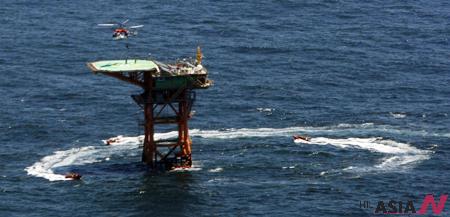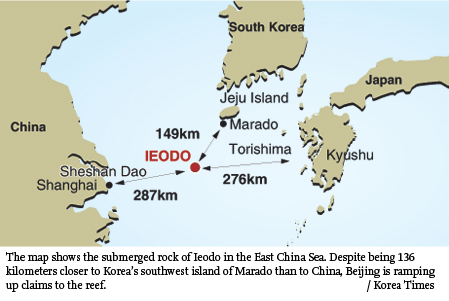
Why Ieodo matters

Reef vital to protecting Korea’s economic zone
Some 150 kilometers southwest of Marado, the nation’s southernmost island, sits Ieodo, a submerged rock with a unique place in Korean lore. As the story goes, fishermen from Jeju Island were destined to spend eternity there should they perish in rough waters.
What’s not myth is the significance of the reef to Korea, whose jurisdiction is protested by China despite it being 136 kilometers closer to the Korean Peninsula. Experts say it is important to address the matter given the natural resources in the East China Sea as well as concerns over Beijing’s naval activities.
“It is of great strategic interest considering China’s strengthening naval power,” said Kang Byeong-cheol, a research fellow of the Jeju-based Society of Ieodo Research. “Because China is a powerful country, Korea must look after the interests of its exclusive economic zone (EEZ).”
The issue ― which will be the focus of an international forum in Taipei this week co-hosted by The Korea Times, the Society of Ieodo Research and Academia Sinica ― has made headlines in recent years due to hardening rhetoric from China.
In March, Liu Cigui, the director of Beijing’s State Oceanic Administration, said Beijing would enhance maritime patrols and enforcement of domestic law over its areas of jurisdiction including Ieodo, prompting Lee Myung-bak to speak out on the matter.
“How we manage the waters near Jeju is closely related to South Korea’s economy,” Lee said. “Thus (we) cannot help but respond sensitively to this issue. Whatever form it may take, Ieodo comes within South Korea’s jurisdiction.”
Boundary woes
Ieodo, known internationally as Socotra Rock, is not seen as a territorial dispute but one over EEZs. With potential oil reserves at stake, China, Japan and Korea all seek to curry international opinion over maritime boundaries in the East China Sea in their favor.
Situated 149 kilometers from Mirado and 287 kilometers from the nearest Chinese island, Sheshandao, Ieodo is closer to Korea, and scholars say the myth gives the reef an important place in Korean culture.
Formerly recognized to be in international waters, the rocks became an issue in 1996 when the international community extended the maximum reach of EEZs ― which give special rights to use of exploration and resources ― to 200 nautical miles (370 kilometers).
In the case of the East China Sea, this created overlapping zones among China, Japan and Korea. Ieodo falls in the overlap of the Chinese and Korean EEZ, meaning it is up to the states to delineate the actual maritime boundary. They have made no headway in 16 rounds of negotiations.
“The East China Sea is narrow. So delimitation is difficult and the sides must continue to negotiate,” Kang said.
Seoul’s case lies in the “median line” principle that delineates a maritime boundary equidistant from the two sides. Korea also argues that the rocks are located on its continental shelf.
Beijing _ calling the reef “Suyan” ― calls for the “natural prolongation” of its land territory and insists the matter be dealt with through a series of negotiations.
After Seoul’s construction of the research center, which collects data on weather, fishery and environmental protection, Beijing began conducting surveillance activities in surrounding waters. It began claiming the rocks as in its jurisdiction in 2006.
Its calls grew louder in July 2011, when it sent three patrol boats to waters there as South Korean workers were trying to raise a recently-sunken carrier.
Strategic concerns
Interest in the sea from the three Northeast Asian countries picked up in 1980 when huge oil and gas deposits were confirmed to be there, on top of abundant fishery resources including croaker, herring, bass, mackerel, flounder and squid.
But conflicts such as Ieodo have prevented the countries from tapping the resources in the sea. Japan also has issues with China over jurisdiction of its Okinawa Trough.
“Seeking mutual benefits or joint exploration of sea-bed resources is considered wishful thinking, too idealistic and utopian,” scholar Choi Yearn-hong said in a recent paper written with Koh Choong-suk, president of the Ieodo research organization.
Some experts believe China’s stance is linked to greater maritime ambitions, highlighted by disputes with Japan over the Diaoyu-Senkaku Islands and with Southeast Asian nations.
This has included protests to South-U.S. military drills near it shores. Through jurisdiction of Ieodo it would secure a sea route for fleets in the area to advance into the Pacific.
Watchers say Beijing is working on a substantial modernization of its maritime paramilitary forces and naval capabilities to enforce its sovereignty and jurisdiction claims. China also has spats with the Philippines and Vietnam over their respective EEZs in the oil-rich South China Sea.
Beijing’s recent rhetoric over Ieodo coincided with that over the South China Sea. China, which in theory claims nearly the entirety of that sea, has hardened rhetoric and sent vessels to test adversaries’ positions.
“To be consistent with its demand that the U.S. cease performing military operations, China would not be able to undertake any military operations in the waters of South Korea’s EEZ,” researcher Kang said. “As such, to preserve its own security interests, China prefers a status quo policy and used strategic ambiguity on the Ieodo issue.”
Raising awareness
In addition to the cultural importance of Ieodo to Jeju and the rest of Korea, the rocks could increase in importance in the future, Choi and Koh said.
“The future will be dictated by changing science and technology. Rocks which have been worthless may be worthwhile in the future by advanced science and technology, and that they may cause more disputes,” they said.
They proposed that the simplest solution should be applied to mitigate any escalation of tension. “They should belong to the next human settlements– island or coastal land. This proposal has been more time-honored than any human rule over the sea.”
With regional players at a seeming stalemate for now, Kang opined that the issue should be continually discussed in the international community.
“Most people don’t’ know about the EEZ regime. It’s important to discuss it so that people know why it is so strategically important.” <The Korea Times/Kim Young-jin>




